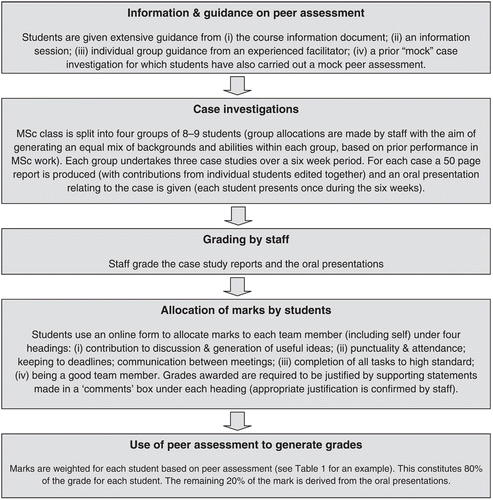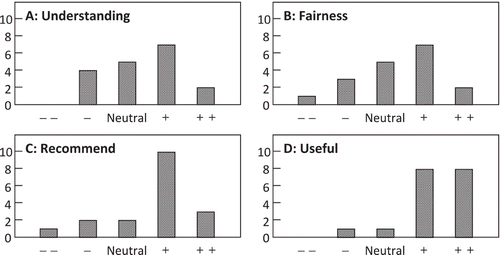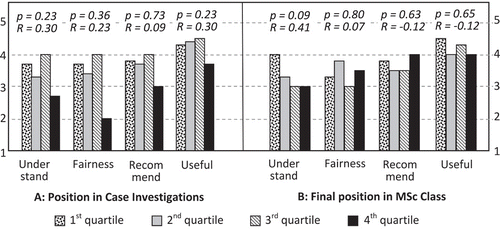Abstract
The validity of peer assessment as well as students experience and understanding of the process are recurrent themes in the educational literature. We studied postgraduates’ experience of summative peer assessment, in particular their perceptions of the process. Student experience was generally positive, and not affected by characteristics such as first language (English or not), area of origin (European Union versus international), previous degree (medical versus science), or current academic performance in the MSc class. Several key themes emerged and are discussed further with possible implications for both practice and future research.
Keywords:
Introduction
Various studies have shown that, used effectively, peer assessment may help students develop a number of key skills including critical thinking (CitationLi and Steckelberg 2004), the ability to identify and articulate comments on both good and bad practice (CitationDavies 2000, Harris 2006) and the development of self-reliant and self-directed learning (CitationSivan 2000, Orsmond 2004). It may also give students a greater awareness of what constitutes a ‘high-level performance’ (CitationGibbs 1999). CitationRace (2001) maintains that ‘when it comes to measuring individuals relative contribution to group work, the only people who really know what the relative contributions are, are the students themselves’ an aspect which highlights that peer assessment is not merely a easy option for tutors. CitationTodd and Hudson (2007) found students were motivated to learn and participate when they anticipated being graded on the quality of the peer assessment. However, CitationHolroyd (2000) found that students doubted each other’s ability to make valid assessments of peers, a view which has been expressed by teaching staff as well. Additionally, simply making comments on, or grading, others work does not necessarily promote development of the requisite skills (CitationAlthauser and Darnall 2001, Sadler and Good 2006, Li et al. 2010).
Having used summative peer assessment as part of the integral course philosophy in a one year taught masters (MSc) programme in Medical Genetics for several years ( and ), we were aware from free text responses on course evaluation questionnaires that a number of students appeared to feel peer review was inaccurate and unfair. However, our own experience, as well as previous studies, have shown that students can be good assessors of each others work (CitationFalchikov and Goldfinch 2000, Sahin 2008). We therefore decided to investigate in a more structured manner the perceptions of the entire class, to clarify whether or not our views of what students gained from the experience were similar to student perceptions. Using anonymous questionnaires our study aimed to gather feedback from students relating to their experience of the peer assessment process.
Figure 1 Overview of the ‘Case Investigations’ and peer assessment. This component represents 30 of the 180 credits required for the MSc in Medical Genetics. Students are given extensive guidance before undertaking three case studies (each lasting two weeks) and producing reports of ~ 50 pages. The grades for these reports are divided amongst the students in the group, weighted by peer assessment that students undertake on each other. It is the students’ experience of the peer assessment part of the process that is addressed in this study.

Table 1 Example of peer marking
Aims of Study
To investigate whether any particular student characteristics such as international/home status, English as first language or not and previous type of degree (BSc or other), performance in other assessments, had an impact on students’ experiences of peer assessment.
To explore the respondent’s experiences of peer assessment more generally.
Method
The sample size was predetermined by the size of the MSc class (40 students). In the week after the peer assessments were submitted students completed a questionnaire asking them about their experiences. There were both scale and free text answer questions. The questions, which required a Likert-scale response (example given for first question), were:
Did you feel you received adequate instruction on how to review your peers?
(1) No, not at all, I was completely unclear about what was expected, (2) No, was slightly unsure of what to do, (3) Neutral, (4) Yes, was reasonably sure of what to do, (5) Yes was very happy with the instruction received.
How ‘fair’ do you think peer assessment is?
Would you recommend this type of assessment to a lecturer who was planning a new MSc?
How useful do you think the skill of peer assessment will be to you in your future career?
Identifying information was removed, leaving only key information: previous degree, nationality, English as first language or not and a rough estimate as to their final position in the MSc class and in the Case Investigations component (first, second, third or fourth quartiles). Data were analysed using non-parametric statistical analysis. The free comments gathered from the questionnaire were analysed in order to summarise emergent themes.
Results
Of the 40 students 18 responded to the questionnaires (45%). The response was generally positive () with 13/18 students either ‘recommending’ or ‘strongly recommending’ this type of assessment. A further two students were unsure and three would not recommend it. Interestingly, 16/18 students thought that peer assessment would be useful or very useful in their future career including three students who were unsure/would not recommend it in a new MSc course. Also, 10/18 students perceived peer assessment as being ‘fair’ or ‘very fair’, four were neutral, and four thought it was ‘unfair’ or ‘very unfair’. Perhaps most enlightening was the fact that only 9/18 students felt clear about what was required of them in the peer assessment process while five were neutral and four felt unclear or very unclear.
Figure 2 Responses to ‘Experience of Peer Assessment’ Questionnaire. Overall responses are shown for the questions: (A) Did you feel you received adequate instruction on how to review your peers?; (B) How ‘fair’ do you think peer assessment is?; (C) Would you recommend this type of assessment to a lecturer who was planning a new MSc?; (D) How useful do you think the skill of peer assessment will be to you in your future career?

Statistical analysis was carried out to determine whether any particular student characteristics had an impact on students’ experiences of peer assessment ( and ).
Table 2 Perception of peer assessment according to first language, fee status and first degree.
Figure 3 Responses to questionnaire grouped according to performance in A: Case Investigations and B: the overall MSc. Figures represent mean scores of answers where 1 was a very negative response, 3 was neutral and 5 was very positive; the four questions related to how well students understood the peer assessment process, how fair they thought peer assessment was, whether they would recommend peer assessment, and whether they thought that peer assessment was a useful skill to learn. Correlation coefficients (R values) show the strength of the correlation between the quartile the student was in and the response to the question (R values in the range 0–0.5 are weak correlations while values of between 0.5–1 demonstrate a stronger relationship between answers to the questions and quartile. Negative R values demonstrate a negative relationship between answers to the questions and quartile). p-Values show the significance of this correlation.

Firstly we also wanted to determine if factors such as international/home status, English as first language or not and previous type of degree (BSc or other) affected student responses to the questions. Using between-groups analysis (Kruskal–Wallis and Mann–Whitney) we found no significant differences between any of the groups when it came to understanding, perceived fairness, and likelihood to recommend peer assessment or expectation of its usefulness ().
A number of further questions explored the respondent’s experiences more generally. The responses to these questions were divided into subtopics and recurrent themes are shown in .
Table 3 Thematic analysis of free text responses on the subject of student experience of peer assessment
Discussion
Perhaps the most enlightening aspect of this study is that background of the student does not influence their experience of peer assessment significantly. CitationSivan (2000) found that adult learners were more positive than school leavers in regard to all aspects of the peer assessment process. In the present study, in which all students had completed at least one prior university degree, and are thus closer to Sivan’s ‘adult learners’, we have ascertained that student perceptions of the fairness and benefits of peer assessment are not influenced by their level of academic performance, i.e. the less well performing students are as likely as the better performing students to perceive peer assessment as a valuable process.
One interesting finding from this research was that there are a significant minority of students who feel they are unprepared for peer assessment and that this was the only aspect which approached significance, i.e. students who were further down the class rankings tended to have difficulties with understanding what was required of them. The concept of ‘adequate preparation’ as fundamental for the success of peer assessment has been raised in several other studies (CitationJordan 1999, CitationBoud et al. 2001, CitationOrsmond 2004, CitationVu and Dall’Alba 2007). From their review of the literature, CitationVan Zundert et al. (2010) suggested that didactic sessions outlining peer review are not nearly as effective as engaging students in discussion of the practice while they are actually undertaking it. Although we have a ‘mock’ case investigation with peer assessment, the very fact that this is not a formally assessed exercise means that many students do not engage with it fully. We have now introduced more group discussion of the requirements of peer assessment to address the problem.
The perception that students may not appreciate being graded by those at the same level as them was not generally supported by the current study; in contrast students felt they were in a better position to judge the contributions made by their team members since most of the group activity takes place without the presence of staff (). Some did raise the issue of perceived fairness of peer assessment; it is possible that this relates to a tendency for less able students to overrate themselves (CitationBoud and Falchikov 1989). By using grade input from an entire group the effect of an occasional ‘outlier’ grade is diluted (), an effect also noted by others (CitationOrsmond 2004, and the case study described therein by Cogdell et al.). In general we observe good correlation between staff versus student assessments, although students tend to grade each other more generously than staff, trends which have been observed in other studies (see for example the meta-analysis by CitationFalchikov and Goldfinch, 2000). Thus available evidence suggests that students do in fact know how to assess each other accurately. How to convey this to students is another issue, and one to which there is unlikely to be an easy solution.
When the class was analysed as a whole, students on average performed two points higher (on a 22 point scale) on Case Investigations than in the other components of the MSc programme. To an extent, though, this higher grading does reflect staff observations that the high-performing students in a group have a tendency to over-compensate for the poorer performance of some of their peers by contributing extra work.
It is clear from the literature that academics appreciate the potential benefits of peer assessment in preparing students for many aspects of their future careers (CitationOrsmond 2004), so it was encouraging from our study to find that the majority of students seem to perceive peer assessment as a useful skill, irrespective of their background or performance level within the class; this is perhaps as a result of the emphasis on team working being a requisite skill for almost all forms of employment.
The comments summarised in provide a fascinating insight into students’ perceptions and experiences. One aspect worthy of consideration is the extent to which a student’s efforts to develop and demonstrate good team-working skills reflects the knowledge that their peers will assess them on these attributes, since (as reviewed by CitationAl-Kadri et al. 2012) students clearly adapt their approaches to tasks in order to try to succeed in the assessments.
Follow up to this study is ongoing. In particular, we would like to follow a cross-section of a class from before the summative Case Investigations begin, through to its conclusion, and use focus groups to explore more fully the issues raised in the thematic analysis reported here. It is possible that this could be done using students as co-researchers in order to try to gain more complete, unbiased insights.
Acknowledgements
With thanks to Douglas Marks for advice on statistics and to Caitlin Welsh for administrative assistance.
References
- Al-Kadri, H.M., Al-Moamary, M.S., Roberts, C. and Van der Vleuten, C.P.M (2012) Exploring assessment factors contributing to students’ study strategies: Literature review. Medical Teacher, 34, S42–S50.
- Althauser, R. and Darnall, K. (2001) Enhancing critical reading and writing through peer reviews: an exploration of assisted performance. Teaching Sociology, 29, 23–35.
- Boud, D., Cohen, R. and Sampson, J. eds. (2001) Peer Learning in Higher Education: learning from and with each other. London, UK: Kogan Page.
- Boud, D., and Falchikov, N. (1989) Student self assessment in higher education: a meta-analysis. Review of Educational Research, 59 (4) 395–430.
- Davies, P. (2000) Computerized peer assessment. Innovations in Education and Training International, 37 (4), 346–355.
- Falchikov, N. and Goldfinch, J. (2000) Student peer assessment in higher education: a meta-analysis comparing peer and teacher marks. Reviews in Educational Research, 70, 287–382.
- Gibbs, G. (1999) Using assessment strategically to change the way students learn. In Assessment Matters in Higher Education: choosing and using diverse approaches, eds. S. Brown and A. Glasner, pp41–53. Buckingham, UK and Philadelphia, PA: Open University Press & SRHE.
- Harris, M.J. (2006) Three steps to teaching abstract and critique writing. International Journal of Teaching and Learning in Higher Education, 17 (2), 136–146.
- Holroyd, C. (2000) Are assessors professional? Student assessment and the professionalism of academics. Active Learning in Higher Education, 1, 28–44.
- Jordan, S. (1999) Self assessment and peer assessment In Assessment Matters in Higher Education: choosing and using diverse approaches, eds S. Brown and A. Glasner, pp172–182. Buckingham, UK and Philadelphia, PA: Open University Press & SRHE.
- Li, L. and Steckelberg, A.L. (2004) Peer assessment support system (PASS). TechTrends, 49 (4), 80–84.
- Li, L., Liu, X. and Steckelberg, A.L. (2010) Assessor or assessee: how student learning improves by giving and receiving peer feedback. British Journal of Educational Technology, 41, 525–536.
- Orsmond, P. (2004) Self- and peer-assessment: guidance on practice in the biosciences. In Teaching Bioscience: Enhancing Learning Series, eds. S. Maw, J. Wilson and Sears S.Leeds: Centre for Bioscience, Higher Education Academy.
- Race, P. (2001) A briefing on self, peer and group assessment, No. 9, ed. S. Maw LTSN Generic Centre. Available at http://www.bioscience.heacademy.ac.uk/ftp/teachingguides/fulltext.pdf.
- Sadler, P.M. and Good, E. (2006) The impact of self- and peer-grading on student learning. Educational Assessment, 11 (1), 1–31.
- Sahin, S. (2008) An application of peer assessment in higher education. The Turkish Online Journal of Educational Technology, 7 (2), 1303–6521.
- Sivan, A. (2000) The implementation of peer assessment: an action research approach. Assessment in Education, 7 (2) 193–213.
- Todd, V. and Hudson, J. (2007) Using graded peer evaluation to improve students’ writing skills, critical thinking ability and comprehension of material in a Principles of Public Relations Course. Journal of College Teaching and Learning, 4 (10), 39–46.
- Van Zundert, M., Sluijsmans, D. and Van Merrienboer, J. (2010) Effective peer assessment processes: research findings and future directions. Learning and Instruction, 20, 270–279.
- Vu, T. and Dall’Alba, G. (2007) Students’ experience of peer assessment in a professional course. Assessment and Evaluation in Higher Education, 32 (5), 541–556.